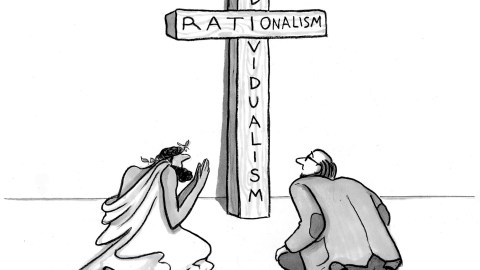Plato Would Have Laughed at Our Era’s Faith In Rationalism

1. History will puzzle over our era’s ruling faith in rationalism. Behavioral economics is shaking that faith but as Nick Romeo notes, Plato described “cognitive biases” ~24 centuries ago.
2. And Plato is far from alone. Hasn’t every realistic writer described humanity’s everywhere-evident cognitive foibles? Except some math-obsessed economists?
3. Doesn’t history, and the arts, and daily experience, testify against those hyper-rational individualists of econo-models?
4. For instance, here’s Shakespeare on confirmation bias: “Trifles light as air / Are to the jealous confirmations strong / As proofs…”
5. The gist of many cognitive biases shouldn’t surprise non-economists (“a bird in the hand is worth two in the bush” = “loss aversion”).
6. Daniel Kahneman’s cognitive-bias-cataloging Nobel involved studying grandmotherly wisdom (every psychologist knows we’re “neither fully rational, nor completely selfish”).
7. Beyond the fun of footnoting philosophy-founding dialogues with cognitive biases, Plato would have laughed at econo-rationalism.
8. And Plato saw money-lust as enslavement to irrational impulses (now driving mindless market priorities).
9. He knew we’re irrationally persuadable. He hated sophists for teaching how to sell seductive surfaces over substance (marketing over product). Marketing, obviously, has always used cognitive biases (under-theorized).
10. Even as many economists declare that we’re rational optimizers, businesses operate on the profitable principle that there’s an easily manipulable fool born every minute.
11. But Plato abetted modern rationalism’s rise by popularizing math-lust. 2,000 years later “falling in love with geometry” was an Enlightenment “occupational hazard.” And today similar math-worship (for algebra + stats) drives economists to irrational math-oholic fantasies.
12. Largely unnoticed is how Plato’s dialogues dramatize the shortcomings of “cognitive individualism.”
13. Social cognition research shows that “individual knowledge is always remarkably shallow”—>“we never think alone.”
14. Isn’t it self-evident that we evolved to reason socially? Thinking, like every other significant aspect of human nature, evolved collectively and tribally (not econo-individualistically).
15. Intriguingly, while “confirmation bias” worsens solo thinking, it can improve group reasoning (other cognitive perspectives countering your biases—>don’t think alone, or with cognitive clones).
16. Countering cognitive individualism is how science succeeds (bias-balancing processes).
17. That famed-science-institution motto “take no man’s word for it,” also applies to your own word. Feeling sure that you’re right often isn’t a reliable intuition. We fall in love with ideas and methods and become blind to our beloved’s faults.
18. Math-method-loving economists strengthen faith in rationalism by routinely excluding “obvious empirical” facts if they’re not equation friendly. This “equation filtering” begets “theory-induced blindness” (field-wide method-level bias).
19. This math-fashioned folly must misrepresent us for its beloved math model-making to work. Arguing that models, like maps, must exclude details, fails because here we’re ignoring known roadblocks. There’s no efficient-allocation market nirvana without rationally optimizing masses.
20. Beyond the matho-pathology of unbehavioral economics, misplaced faith in rationalism enabled Donald Trump’s presidency. He grasps empirical psychology better than many rationalists. Every salesperson knows persuasion isn’t factual or logical, but unavoidably emotional, and trust-dependent (see Aristotle on ethos, pathos, logos).
21. Ways of life that deny our deeply limited, deeply flawed, deeply social nature are doomed to history’s dustbin.
Illustration by Julia Suits, The New Yorker cartoonist & author of The Extraordinary Catalog of Peculiar Inventions





